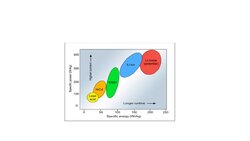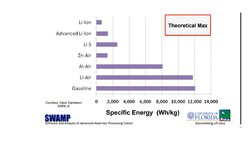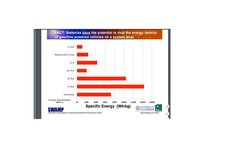Yeah... the other one that really interested me was the saltwater battery for grid storage, because it could be so cheap in volume.
It's started
- Thread starter begreen
- Start date
-
Active since 1995, Hearth.com is THE place on the internet for free information and advice about wood stoves, pellet stoves and other energy saving equipment.
We strive to provide opinions, articles, discussions and history related to Hearth Products and in a more general sense, energy issues.
We promote the EFFICIENT, RESPONSIBLE, CLEAN and SAFE use of all fuels, whether renewable or fossil. -
Super Cedar firestarters 30% discount Use code Hearth2024 Click here
You are using an out of date browser. It may not display this or other websites correctly.
You should upgrade or use an alternative browser.
You should upgrade or use an alternative browser.
- Status
- Not open for further replies.
Yes, that has lots of cycles. Not sure how the Aquion bankruptcy is going. News is that is has a new owner, but not sure who and the Aquion Energy website is still down.
https://www.greentechmedia.com/arti...battery-assets-sold-to-austrias-bluesky-energ
https://www.energy-storage.news/new...ion-energy-back-from-dead-under-new-ownership
There's a couple 2KW cells for sale on eBay.
http://www.ebay.com/itm/Aquion-Sodi...c-Salt-water-Solar-Storage-51AH-/201541771510
https://www.greentechmedia.com/arti...battery-assets-sold-to-austrias-bluesky-energ
https://www.energy-storage.news/new...ion-energy-back-from-dead-under-new-ownership
There's a couple 2KW cells for sale on eBay.
http://www.ebay.com/itm/Aquion-Sodi...c-Salt-water-Solar-Storage-51AH-/201541771510
Last edited:
More info on Toyota in production engineering of a solid state battery.
https://arstechnica.com/cars/2017/0...solid-state-ev-batteries-by-2022-reports-say/
https://arstechnica.com/cars/2017/0...solid-state-ev-batteries-by-2022-reports-say/
More info on Toyota in production engineering of a solid state battery.
https://arstechnica.com/cars/2017/0...solid-state-ev-batteries-by-2022-reports-say/
If they pull it off, I guess the first mass market 'flying taxi' around 2030 will have a Toyota badge.

If they pull it off, I guess the first mass market 'flying taxi' around 2030 will have a Toyota badge.
For that to be true the specific energy (Energy / unit weight ) and/or specific power ( Power / unit weight) would have to be lower than Li-ion. Where did you see that in the article? I missed it
For that to be true the specific energy (Energy / unit weight ) and/or specific power ( Power / unit weight) would have to be lower than Li-ion. Where did you see that in the article? I missed it
Right under the headline....it says:
Solid electrolyte could make electric cars lighter, battery smaller.
Here are a couple of slides that emphasize the point from
https://ceramics.org/wp-content/uploads/2011/08/energy-ss-batteries-jones.pdf
Nothing I see comes close to gasoline for specific energy except Li-Air and Al-Air


https://ceramics.org/wp-content/uploads/2011/08/energy-ss-batteries-jones.pdf
Nothing I see comes close to gasoline for specific energy except Li-Air and Al-Air


Right under the headline....it says:
Solid electrolyte could make electric cars lighter, battery smaller.
OK, thanks
But it would help a lot if they gave a number
Not inclined to buy the gasoline comparison....does it include the thermodynamic losses of the gasoline combustion engine (and its mass) to get to useable power/energy OUTPUT per kg drivetrain?
More to the point, Lithium powered aircraft are already available (with marginal range)....the significant improvement touted by SS battery developers would be enough to make autonomous electric aircraft readily feasible. Their absence despite maturity of combustion engines suggests that power/energy density is NOT the barrier to cheap, autonomous, highly reliable aircraft....but rather reliability, powertrain lifetime, control, power distribution, etc.
EDIT: My question is answered on slides 36/37 of the above link. But that talk is from 2011!
More to the point, Lithium powered aircraft are already available (with marginal range)....the significant improvement touted by SS battery developers would be enough to make autonomous electric aircraft readily feasible. Their absence despite maturity of combustion engines suggests that power/energy density is NOT the barrier to cheap, autonomous, highly reliable aircraft....but rather reliability, powertrain lifetime, control, power distribution, etc.
EDIT: My question is answered on slides 36/37 of the above link. But that talk is from 2011!
Last edited:
A little more info on what Toyota appears to be pursuing.
https://chargedevs.com/newswire/jap...rs-as-electrolytes-for-solid-state-batteries/
https://chargedevs.com/newswire/jap...rs-as-electrolytes-for-solid-state-batteries/
More development on the battery front. Yuasa is working together with Mitusubishi to develop a lithium battery they say will double EV car range. The goal is to have it on market by 2020.
https://asia.nikkei.com/Japan-Update/GS-Yuasa-s-new-battery-to-double-electric-car-range
https://asia.nikkei.com/Japan-Update/GS-Yuasa-s-new-battery-to-double-electric-car-range
Ashful
Minister of Fire
I notice on the George's bubble graph in post #82, that specific energy (i.e. longer range) is increasing more rapidly than specific power (i.e. horsepower). I assume this is because some EV's are already hitting what most would consider acceptable power numbers, with very impressive low-speed torque, and most see their primary shortcoming as range.
However, on the high end, EV's are still falling short of gas engines. A Tesla Model S P100 has an impressive 30 foot time, off the line, but not very impressive 1/4 mile times for a car with 0-60mph times under 2.3 seconds. In other words, superbly torquey for around-town fun, but less impressive highway-speed passing power.
However, on the high end, EV's are still falling short of gas engines. A Tesla Model S P100 has an impressive 30 foot time, off the line, but not very impressive 1/4 mile times for a car with 0-60mph times under 2.3 seconds. In other words, superbly torquey for around-town fun, but less impressive highway-speed passing power.
Last edited:
WoodyIsGoody
Minister of Fire
However, on the high end, EV's are still falling short of gas engines. A Tesla Model S P100 has an impressive 30 foot time, off the line, but not very impressive 1/4 mile times for a car with 0-60mph times under 2.3 seconds. In other words, superbly torquey for around-town fun, but less impressive highway-speed passing power.
Thank-you for pointing out the disappointing passing performance of the Tesla. Gas engines can do it way better.
It takes the Tesla S P100 1.1 seconds in a 45 mph-65 mpg passing test. For only $1.15 million dollars, the McLaren P1 can do it in 0.9 seconds! That's two tenths of a second faster. Kinda puts the Tesla to shame.
Moral of the story: If you want to do a quick pass, use a practical gasoline car like the McLaren P1. It will be the best $1.15 million you ever spent. And you can utterly humiliate those pesky drivers of slow electric cars.
Ashful
Minister of Fire
You pick the absurd for effect, but you're neglecting that many $65k gas cars beat the pants of a $110k Tesla S P100D in acceleration beyond 30 mph. No need to go to $1M McLarens, or even much beyond half the cost of the Tesla.Thank-you for pointing out the disappointing passing performance of the Tesla. Gas engines can do it way better.
It takes the Tesla S P100 1.1 seconds in a 45 mph-65 mpg passing test. For only $1.15 million dollars, the McLaren P1 can do it in 0.9 seconds! That's two tenths of a second faster. Kinda puts the Tesla to shame.
Moral of the story: If you want to do a quick pass, use a practical gasoline car like the McLaren P1. It will be the best $1.15 million you ever spent. And you can utterly humiliate those pesky drivers of slow electric cars.
Ashful
Minister of Fire
They fall short way before 90 mph. The EV's own 0 - 30 mph, not much beyond that.Yeah, but what if you need to pass in a hurry at 90 mph?
WoodyIsGoody
Minister of Fire
You pick the absurd for effect, but you're neglecting that many $65k gas cars beat the pants of a $110k Tesla S P100D in acceleration beyond 30 mph. No need to go to $1M McLarens, or even much beyond half the cost of the Tesla.
Yeah, electric cars can't do a decent highway passing maneuver, everybody knows that. With a 1/4 mile time of 10.5 sec. at only 125 mph, we can see that it takes the Tesla an astonishing 8 seconds to accelerate from 60 mph to 125 mph. That's humiliating. It would be dangerous to do any highway passing with such sluggish high speed performance. I like completing my pass at no less than 140 mph. A car with good power is going at least 135 mph after 1/4 mile. That's why I've never passed anyone in my pick-up truck. It only has a 4.6L V-8.
Electric cars are good under 30 mph but they really are not suitable for a real man to drive them on a real highway. You need a gas car for that. And not a wimpy girly-man car like a Buick. For good passing you need a Subaru WRX or Corvette at a minimum. Not electric. Unless you want to end up in the hospital after trying to pass someone.

A Corvette Z06 can do the 45-65 passing acceleration in only 1.4 seconds. It takes the Tesla P100D a leisurely 1.1 seconds. Wait, that's faster than the Z06? Who would have thunk?
Last edited:
I notice on the George's bubble graph in post #82, that specific energy (i.e. longer range) is increasing more rapidly than specific power (i.e. horsepower). I assume this is because some EV's are already hitting what most would consider acceptable power numbers, with very impressive low-speed torque, and most see their primary shortcoming as range.
However, on the high end, EV's are still falling short of gas engines. A Tesla Model S P100 has an impressive 30 foot time, off the line, but not very impressive 1/4 mile times for a car with 0-60mph times under 2.3 seconds. In other words, superbly torquey for around-town fun, but less impressive highway-speed passing power.
The real problem here is lack of a transmission. A one speed system is ok for for driving, but limits power at very high speed. If you build it to give power at high speed, you lose some efficiency at lower speeds.
You need to shop for an electric super car with a multi-speed transmission....they are coming.
WoodyIsGoody
Minister of Fire
The real problem here is lack of a transmission. A one speed system is ok for for driving, but limits power at very high speed. If you build it to give power at high speed, you lose some efficiency at lower speeds.
Yes, true. I've heard the Tesla feels like it runs out of passing power somewhere around 130-140 mph. That's going to make it tricky to pass anyone going faster than 125 or 130 mph unless you have a good long straight road. Much better in a gas powered car.

In 53 yrs of driving I have driven over 85mph on American roads maybe 3 times. Maybe 6 more times at 100mph if I include European driving. In none of those cases was there a craving for massive amounts of more acceleration. For the most part the only thing passing me in France and Germany at that speed were crotch rockets flying by at ridiculous speeds, sometimes between lanes!
Last edited:
Ashful
Minister of Fire
Geez, you do get defensive, Woody. Just because you're not a car guy, doesn't mean anyone who is must be off their rocker. Some might say the same for folks that waste their time with woodstoves, but there's different strokes for different folks.Yeah, electric cars can't do a decent highway passing maneuver, everybody knows that. With a 1/4 mile time of 10.5 sec. at only 125 mph, we can see that it takes the Tesla an astonishing 8 seconds to accelerate from 60 mph to 125 mph. That's humiliating.
The point is just that they're very fast at low speed, but fall short of gas engine cars costing much less, at highway speeds. If you need some actual 60 - 100 mph numbers for comparison:
Tesla P100d: 7.9 seconds @ $140,000
Camaro ZL1: 4.7 seconds @ $61,140
Dodge Hellcat: 4.3 seconds @ $62,495
Dodge Demon: 2.8 seconds(!) @ $84,995
The Tesla P100d is cool for so many reasons, but highway acceleration ain't one of 'em.
I'm not sure who passes on the highway today at 45 mph. On my local expressways, typical traffic speed is more around 75-80 mph.A Corvette Z06 can do the 45-65 passing acceleration in only 1.4 seconds. It takes the Tesla P100D a leisurely 1.1 seconds. Wait, that's faster than the Z06? Who would have thunk?
If you want some numbers you can actually believe (Car and Driver testing), the 60-100 mph acceleration on the Z06 is 3.3 seconds, less than half that of the P100d. I didn't include this originally, because I'm comparing the Tesla to gas cars that cost roughly half as much, the Corvette being outside that class.
Last edited:
WoodyIsGoody
Minister of Fire
The point is just that they're very fast at low speed, but fall short of gas engine cars costing much less, at highway speeds.
Yes! I'm agreeing with you!
To go really fast at higher speeds you need a gas car! A Tesla is not going to satisfy if you like racing on a track or going super fast on public roads. A Dodge Demon will humiliate a Tesla, maybe not 0-60 mph, but at faster speeds.
I am ALL about performance. Maybe once Tesla gets their act together they will have an offering that satisfies my desire for top performance at high speed. Until then, Tesla is for girly-men who don't care about having a superior vehicle to get you where you are going without lolly-gagging around.
Just because it's fast at 0-60 mph doesn't mean its good at 60-100 mph and beyond! The Tesla falls flat on it's face when it comes to REAL performance!
Have you seen this product? They claim 200+ hrs on a single dose of saltwater.Yeah... the other one that really interested me was the saltwater battery for grid storage, because it could be so cheap in volume.
http://www.hydralight.net/
Last edited:
- Status
- Not open for further replies.
Similar threads
- Replies
- 59
- Views
- 4K
- Replies
- 5
- Views
- 849
- Replies
- 105
- Views
- 8K
- Replies
- 269
- Views
- 21K


